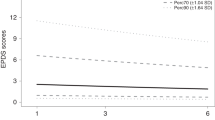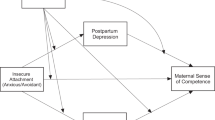Abstract
The aim of this study was to analyze the impact of maternal postpartum depression and/or anxiety disorders according to DMS-IV on maternal self-confidence throughout infancy and early childhood. Exploratively, associations between maternal attachment insecurity and maternal self-confidence at pre-school age were examined. The sample (N = 54) of this prospective longitudinal study was comprised of n = 27 women with postpartum depression and/or anxiety disorders according to DSM-IV criteria and n = 27 healthy women without present or history of mental health disorders or psychotherapy. Data was collected in the postpartum period (M = 60.08 days) and at pre-school age (M = 4.7 years). Subjects were recruited between 2004 and 2011 in South Germany. Data revealed a significant difference in maternal self-confidence between clinical and control group at child′s pre-school age: Women with postpartum depression and/or anxiety disorder scored lower on maternal self-confidence than healthy controls, but only if they had current SCID-diagnoses or partly remitted symptoms. According to explorative analyses maternal attachment insecurity turned out to be the strongest predictor of maternal self-confidence at pre-school age besides maternal mental health status. The results emphasize the impact of attachment insecurity and maternal mental health regarding maternal self-confidence leading to potential adverse long-term consequences for the mother–child relationship. Attachment based interventions taking maternal self-confidence into account are needed.

Similar content being viewed by others
References
Britton, J. R. (2008). Maternal anxiety: Course and antecedents during the early postpartum period. Depression and Anxiety, 25(9), 793–800. doi:10.1002/da.20325.
Reck, C., Struben, K., Backenstrass, M., et al. (2008). Prevalence, onset and comorbidity of postpartum anxiety and depressive disorders. Acta Psychiatrica Scandinavica, 118(6), 459–468. doi:10.1111/j.1600-0447.2008.01264.x.
Cooper, P. J., & Murray, L. (1998). Postnatal depression. Clinical review. British Journal of Medicine, 316, 1884–1886.
Brown, S., & Lumley, J. (2000). Physical health problems after childbirth and maternal depression at six to seven months postpartum. British Journal of Obstetrics and Gynaecology, 107, 1194–1201.
Wenzel, A., Haugen, E., Jackson, L., & Robinson, K. (2003). Prevalence of generalized anxiety at 8 weeks postpartum. Archives Of Women’s Mental Health (serial online). 6(1):43–49. Available from: PsycINFO, Ipswich, MA. Accessed Nov 24, 2013.
Andrews, G., Sanderson, K., Slade, T., et al. (2000). Why does the burden of disease persist? Relating the burden of anxiety and depression to effectiveness of treatment. Bulletin of the World Health Organization, 78(4), 446–454.
Masi, G., Millepiedi, S., Mucci, M., et al. (2004). Generalized anxiety disorder in referred children and adolescents. Journal of the American Academy of Child and Adolescent Psychiatry, 43(6), 752–760.
Andrews, G., Hall, W., & Teesson, M., et al. (1999). The mental health of Australians. Mental Health Branch, Commonwealth Department of Health and Aged Care, Canberra.
Field, T., Hernandez-Reif, M., & Diego, M. A. (2007). Still-face and separation effects on depressed mother–infant interactions. Infant Mental Health Journal, 28(3), 314–323.
Moehler, E., Brunner, R., Wiebel, A., et al. (2006). Maternal depressive symptoms in the postnatal period are associated with long-term impairment of mother–child bonding. Archives of Women’s Mental Health, 9(5), 273–278. doi:10.1007/s00737-006-0149-5.
Reck, C., Hunt, A., Fuchs, T., et al. (2004). Interactive regulation of affect in postpartum depressed mothers and their infants: An overview. Psychopathology, 37, 272–280.
Tronick, E., & Reck, C. (2009). Infants of depressed mothers. Harvard Review of Psychiatry, 17(2), 147–156. doi:10.1080/10673220902899714.
Nicol-Harper, R., Harvey, A., & Stein, A. (2007). Interactions between mothers and infants: Impact of maternal anxiety. Infant Behavior & Development, 30(1), 161–167.
Goodman, S. H., Rouse, M. H., Connell, A. M., et al. (2011). Maternal depression and child psychopathology: A meta-analytic review. Clinical Child and Family Psychology Review, 14(1), 1–27. doi:10.1007/s10567-010-0080-1.
Feldman, R., Granat, A., Pariente, C., et al. (2009). Maternal depression and anxiety across the postpartum year and infant social engagement, fear regulation, and stress reactivity. Journal of the American Academy of Child and Adolescent Psychiatry, 48(9), 919–927. doi:10.1097/CHI.0b013e3181b21651.
Kötter, C., Stemmler, M., Bühler, A., et al. (2010). Mütterliche depressivität, Erziehung und kindliche Erlebens- und Verhaltensprobleme. Kindheit und Entwicklung, 19(2), 109–118. doi:10.1026/0942-5403/a000006.
Luoma, I., Tamminen, T., Kaukonen, P., et al. (2001). Longitudinal study of maternal depressive symptoms and child well-being. Journal of the American Academy of Child and Adolescent Psychiatry, 40(12), 1367–1374. doi:10.1097/00004583-200112000-00006.
Murray, L., Woolgar, M., Cooper, P., et al. (2001). Cognitive vulnerability to depression in 5-year-old children of depressed mothers. Journal of Child Psychology and Psychiatry, 42(7), 891–899. doi:10.1111/1469-7610.00785.
Righetti-Veltema, M., Bousquet, A., & Manzano, J. (2003). Impact of postpartum depressive symptoms on mother and her 18-month-old infant. European Child and Adolescent Psychiatry, 12(2), 75–83. doi:10.1007/s00787-003-0311-9.
Weinberg, M. K., & Tronick, E. Z. (1998). The impact of maternal psychiatric illness on infant development. Journal of Clinical Psychiatry, 59(Suppl 2), 53–61.
Van den Bergh, B. R. H., Mulder, E. J. H., Mennes, M., et al. (2005). Antenatal maternal anxiety and stress and the neurobehavioural development of the fetus and child: Links and possible mechanisms. A review. Neuroscience and Biobehavioral Reviews, 29(2), 237–258. doi:10.1016/j.neubiorev.2004.10.007.
Woodruff-Borden, J., Morrow, C., Bourland, S., et al. (2002). The behavior of anxious parents: Examining mechanisms of transmission of anxiety from parent to child. Journal of Clinical Child and Adolescent Psychology, 31(3), 364–374. doi:10.1207/153744202760082621.
Teti, D. M., & Gelfand, D. M. (1991). Behavioral competence among mothers of infants in the first year: The mediational role of maternal self-efficacy. Child Development, 62(5), 918–929. doi:10.2307/1131143.
Coleman, P. K., & Karraker, K. H. (2003). Maternal self-efficacy beliefs, competence in parenting, and toddlers’ behavior and developmental status. Infant Mental Health Journal, 24(2), 126–148. doi:10.1002/imhj.10048.
Bandura, A. (1977). Self-efficacy: Toward a unifying theory of behavioral change. Psychological Review, 84(2), 191–215. doi:10.1037/0033-295x.84.2.191.
Bandura, A. (1997). Self-efficacy: The exercise of control. New York, NY: W H Freeman/Times Books/Henry Holt & Co.
Bandura, A. (1989). Regulation of cognitive processes through perceived self-efficacy. Developmental Psychology, 25(5), 729–735. doi:10.1037/0012-1649.25.5.729.
Janicke, D. M., & Finney, J. W. (2003). Children’s primary health care services: Social-cognitive factors related to utilization. Journal of Pediatric Psychology, 28(8), 547–557.
Eaton, M. M. (2008). Self-efficacy in first-time mothers. US: ProQuest Information & Learning.
O’Neil, J., Wilson, M. N., Shaw, D. S., et al. (2009). The relationship between parental efficacy and depressive symptoms in a diverse sample of low income mothers. Journal of Child and Family Studies, 18(6), 643–652. doi:10.1007/s10826-009-9265-y.
Porter, C. L., & Hsu, H.-C. (2003). First-time mothers’ perceptions of efficacy during the transition to motherhood: Links to infant temperament. Journal of Family Psychology, 17(1), 54–64. doi:10.1037/0893-3200.17.1.54.
Sevigny, P. R., & Loutzenhiser, L. (2010). Predictors of parenting self-efficacy in mothers and fathers of toddlers. 36(2):179–89. doi:10.1111/j.1365-2214.2009.00980.x.
Reck, C., Noe, D., Gerstenlauer, J., et al. (2012). Effects of postpartum anxiety disorders and depression on maternal self-confidence. Infant Behavior & Development. doi:10.1016/j.infbeh.2011.12.005.
Haslam, D. M., Pakenham, K. I., & Smith, A. (2006). Social support and postpartum depressive symptomatology: The mediating role of maternal self-efficacy. Infant Mental Health Journal, 27(3), 276–291. doi:10.1002/imhj.20092.
Howell, E. A., Mora, P. A., DiBonaventura, M. D., et al. (2009). Modifiable factors associated with changes in postpartum depressive symptoms. Archives of Women’s Mental Health, 12(2), 113–120. doi:10.1007/s00737-009-0056-7.
Leerkes, E. M., & Burney, R. V. (2007). The development of parenting efficacy among new mothers and fathers. Infancy, 12(1), 45–67. doi:10.1111/j.1532-7078.2007.tb00233.x.
Froman, R. D., & Owen, S. V. (1990). Mothers’ and nurses’ perceptions of infant care skills. Research in Nursing & Health, 13(4), 247–253. doi:10.1002/nur.4770130407.
Seo, S.-J. (2004). Maternal self-efficacy, quality of parenting, and child developmental outcome among mothers with young children from early head start. USA: ProQuest Information & Learning.
Gustave-Bochner, B. (2008). Changes in depression, anxiety and subjective well-being among new mothers in an professionally facilitated support group. New York, NY: New York University.
Logsdon, M. C., Wisner, K., & Hanusa, B. H. (2009). Does maternal role functioning improve with antidepressant treatment in women with postpartum depression? Journal of Women’s Health, 18(1), 85–90. doi:10.1089/jwh.2007.0635.
Bifulco, A., Figueiredo, B., Henshaw, C., et al. (2004). Maternal attachment style and depression associated with childbirth: Preliminary results from a European and US cross-cultural study. The British Journal Of Psychiatry, 184(Suppl46), s31–s37.
Murphy, B., & Bates, G. (1997). Adult attachment style and vulnerability to depression. Personality and Individual Differences, 22(6), 835–844.
Xue, Y., & Yang, Y. (2013). Study on the adult attachment styles of the outpatients with anxiety disorder. Chinese Journal of Clinical Psychology, 21(1), 81–84.
Eng, W., Heimberg, R., Hart, T., Schneier, F., & Liebowitz, M. (2001). Attachment in individuals with social anxiety disorder: The relationship among adult attachment styles, social anxiety, and depression. Emotion, 1(4), 365–380.
Mickelson, K., Kessler, R., & Shaver, P. (1997). Adult attachment in a nationally representative sample. Journal of Personality & Social Psychology, 73(5), 1092–1106.
Diehl, M., Elnick, A., Bourbeau, L., & Labouvie-Vief, G. (1998). Adult attachment styles: Their relations to family context and personality. Journal of Personality and Social Psychology, 74(6), 1656–1669.
McMahon, C., Trapolini, T., & Barnett, B. (2008). Maternal state of mind regarding attachment predicts persistence of postnatal depression in the preschool years. Journal of Affective Disorders, 107(1–3), 199–203.
Bifulco, A., Kwon, J., Jacobs, C., Moran, P., Bunn, A., & Beer, N. (2006). Adult attachment style as mediator between childhood neglect/abuse and adult depression and anxiety. Social Psychiatry & Psychiatric Epidemiology, 41(10), 796–805.
Wittchen, H.-U., Wunderlich, U., Gruschwitz, S. & Zaudig, M. (1997). SKID-I. Strukturiertes Klinisches interview für DSM-IV. Achse I: Psychische Störungen. Interviewheft. Göttingen: Hogrefe.
Bloom, K., & Lips, H. M. (1988, April). New scale of maternal selfconfidence. Poster session presented at the International Conference on Infant Studies, Washington, DC.
Bifulco, A., Mahon, J., Kwon, J., Moran, P., & Jacobs, C. (2003). The Vulnerable Attachment Style Questionnaire (VASQ): An interview-based measure of attachment styles that predict depressive disorder. Psychological Medicine, 33(6), 1099–1110.
Bifulco, A., Moran, P., Ball, C., & Bernazzani, O. (2002). Adult attachment style. I: Its relationship to clinical depression. Social Psychiatry and Psychiatric Epidemiology, 37(2), 50–59.
Saß, H., Wittchen, H.-U., & Zaudig, M. (1994). Diagnostic and statistical manual of mental disorders-DSM-IV. Göttingen: Hogrefe.
Conrad, B. (1991). Using self-efficacy theory to explain maternal confidence during toddlerhood. US: ProQuest Information & Learning.
Coleman, P. K., & Karraker, K. H. (2000). Parenting self-efficacy among mothers of school-age children. Family Relations, 49(1), 13–24.
Cohen, J. (1977). Statistical power analysis for the behavioral sciences (Rev. Ed.). Hillsdale, NJ: Lawrence Erlbaum Associates, Inc.
Hopkins, J., Campbell, S., & Marcus, M. (1987). Role of infant-related stressors in postpartum depression. Journal of Abnormal Psychology, 96(3), 237–241.
Roberts, J., Gotlib, I., & Kassel, J. (1996). Adult attachment security and symptoms of depression: The mediating roles of dysfunctional attitudes and low self-esteem. Journal of Personality and Social Psychology, 70(2), 310–320.
Acknowledgments
First and foremost, we would like to express our thanks to the mothers participating in the study. Also, we would like to thank the maternity clinics and their staff in Heidelberg (St. Josef’s Hospital, Saint Elisabeth’s Hospital, Salem Hospital, and the Gynecological Clinic at the University of Heidelberg) as well as participating clinics in Darmstadt (Alice-Hospital and Darmstadt Hospital) for their willingness to cooperate and their support in recruiting patients. The study was supported by a grant from the Program of Research Support at the University Medical Faculty, Heidelberg (funding period: 2003–2004) as well as by Köhler and Jung Foundation.
Author information
Authors and Affiliations
Corresponding author
Rights and permissions
About this article
Cite this article
Zietlow, AL., Schlüter, M.K., Nonnenmacher, N. et al. Maternal Self-confidence Postpartum and at Pre-school Age: The Role of Depression, Anxiety Disorders, Maternal Attachment Insecurity. Matern Child Health J 18, 1873–1880 (2014). https://doi.org/10.1007/s10995-014-1431-1
Published:
Issue Date:
DOI: https://doi.org/10.1007/s10995-014-1431-1




